|
|
|
Sort Order |
|
|
|
Items / Page
|
|
|
|
|
|
|
| Srl | Item |
| 1 |
ID:
137680


|
|
|
|
|
| Summary/Abstract |
This study evaluates scenarios for the oil production in Peru applying a Hubbert model. Two scenarios for the estimated ultimate recovery (EUR) were proposed: the first, in which low investments in E&P and social and environmental barriers undermine the development of oil resources beyond the limits characterized as 2P; the second, more optimistic, in which current exploratory and production areas in Amazonia and low-explored Offshore-Shelf basins are developed, thus, increasing EUR to 3P reserves plus contingent resources. Findings show that oil production in Peru has not followed a Single-Hubbert pattern, except for the area with more drilling activity and the highest accumulated production in the Northwest coast. Actually, institutional and regulation changes and less-attractive periods for operators due to poor results in oil discoveries explain why a multi-Hubbert approach better depicted the oil production in Peru. Peru has the potential to achieve a second peak of 274 kbpd of crude oil, overcoming the peak of 195 kbpd, reached in 1982. However, most of the remaining production would be located in Amazonia, where social and environmental issues pose critical challenges.
|
|
|
|
|
|
|
|
|
|
|
|
|
|
|
|
| 2 |
ID:
100277


|
|
|
|
|
| Publication |
2010.
|
| Summary/Abstract |
This study revisits the debate on trade reform in Latin America, focusing specifically on what combinations of conditions were necessary and sufficient for very rapid trade liberalization. It departs significantly from two types of studies that have been previously used to examine Latin American trade reform: (1) those using large samples and linear statistics to test the mean effects of variables on levels of trade protection and (2) those isolating necessary conditions for rapid reform but using a small number of case studies. Using fuzzy-set qualitative comparative analysis and short case studies, the study considers trade policy in sixty-one administrations. It finds that a key motivating factor for rapid trade opening is potential resistance from protected industry; it further identifies several other important enabling conditions, such as hyperinflation, devaluation, and an unconstrained executive. In combination, these enabling conditions are sufficient to account for a high percentage of rapid reform episodes.
|
|
|
|
|
|
|
|
|
|
|
|
|
|
|
|
| 3 |
ID:
152784
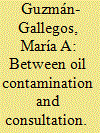

|
|
|
|
|
| Summary/Abstract |
In this article, I explore the interconnections among severe oil contamination, a state-led consultation process, and compensation practices in Peru’s oldest oilfield. I discuss the way in which four indigenous organisations and their constituencies produced evidence of oil contamination, and forced the state to question Peru’s current oil extraction practices. I look at the compensation demands and corporate payments that followed, and examine how compensation became a dominant tool for both appeasing increasing uprisings, and for counteracting what local people perceive as state abandonment. Focusing on the effects that compensation measures have on daily life, I analyse how equivalences between affected water and lands, on one hand, and state investments and monetary payments on the other, are established. I discuss how these equivalences have led to making indigenous ways of life irrelevant, and how this has been reinforced by the emphasis on due process during state-led consultation.
|
|
|
|
|
|
|
|
|
|
|
|
|
|
|
|
| 4 |
ID:
144278
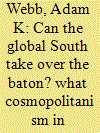

|
|
|
|
|
| Summary/Abstract |
As the West’s centrality fades, the global South may have a decisive influence in shaping future world order. Will that future see a retreat from globalisation to hard-edged particularisms? Or will the emerging post-Westphalian global society let the global South take over the baton of cosmopolitan institution building in its own way? This article draws on a multi-country survey of educated youth to find promising signs of imagined common ground with other countries. It suggests the flavours of cosmopolitan integration that the global South is likely to support in coming decades.
|
|
|
|
|
|
|
|
|
|
|
|
|
|
|
|
| 5 |
ID:
109946
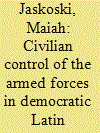

|
|
|
|
|
| Publication |
2012.
|
| Summary/Abstract |
This article presents a new framework for measuring civilian control of the armed forces in post-transition Latin America. Specifically, it builds on approaches that focus on military privileges and military protest, particularly in the face of government challenges to those privileges. Adding mission performance as a third dimension both helps us measure civilian control more accurately and provides causal leverage, as the three dimensions can interact. The paper demonstrates the utility of the framework through a close-up analysis of a critical case: civil-military relations in Peru since the 1990s.
|
|
|
|
|
|
|
|
|
|
|
|
|
|
|
|
| 6 |
ID:
064645
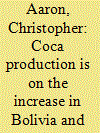

|
|
|
| 7 |
ID:
132892
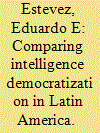

|
|
|
|
|
| Publication |
2014.
|
| Summary/Abstract |
This article aims to contribute to the understanding of the intelligence democratization process in new democracies comparing three South American countries: Ecuador, Peru, and Argentina. With a background of authoritarian legacies ('political police' style intelligence agencies controlled by the military) under particular political circumstances and changing strategic environments, these countries experienced disparate trajectories, prescriptions, and outcomes in their efforts to reform their intelligence communities. Drawing on new institutionalism, historical moments and relevant events shaping the dynamics of intelligence democratization are highlighted for each case, depicting failures and successes, and identifying drivers of change.
|
|
|
|
|
|
|
|
|
|
|
|
|
|
|
|
| 8 |
ID:
094003


|
|
|
|
|
| Publication |
2010.
|
| Summary/Abstract |
During their more than 100-year-long presence in Peru, Japanese descendants (Nikkei) have been linguistically integrated into Peruvian society. The portion of the population that speaks Japanese in daily life has been decreasing dramatically, and the majority of younger Nikkei typically grow up speaking mainly Spanish, mixed with a specific Japanese lexicon that has been transmitted intergenerationally within families. To prevent the complete loss of ancestral language and cultural traits, private all-day elementary and secondary schools, founded and run by the Nikkei, have been offering additional Japanese language educational programs. Drawing from an ethnographic study at one such Nikkei-sponsored secondary school in Lima, this article portrays the students' inconsistent and ambiguous attitudes toward learning Japanese as their heritage. More specifically, the article focuses on returnee students from Japan, a recently emerged diaspora group of youngsters who have spent time in Japan as emigrants and then returned to resettle in Peru. The article examines the returnees' negotiations with the language teachers regarding what is considered to be "proper" or "standard" Japanese. Classroom observations and interviews with both teachers and students demonstrate how contested the "heritage" of heritage language education is-defined as it is through social, economic, and political positions and interests of participants in the educational process. The study also shows how the institutionalized heritage language education at school sometimes results in encouraging the students to "dis-inherit" what they have learned outside school: this may relate to their family's social status in their ancestral country.
|
|
|
|
|
|
|
|
|
|
|
|
|
|
|
|
| 9 |
ID:
152871
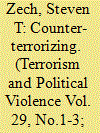

|
|
|
|
|
| Summary/Abstract |
In this article I identify and evaluate numerous reasons why torture became common practice during the state counterterrorism campaign in Peru between 1980 and 2000, despite international and domestic legal obligations to protect human rights. I describe common structural conditions, organizational factors, and individual-level explanations often associated with torture practices. I then identify seven logics and motivations behind torture use in counterterrorism campaigns. I describe and analyze actual torture use in Peru using quantitative incident-level data, and I provide descriptive statistics concerning variation in the frequency and methods of torture. Finally, I examine specific incidents of torture to illustrate and assess the different logics and motivations for torture. I draw heavily from testimonies collected by Peru's Truth and Reconciliation Commission. I also rely on personal interviews carried out during fieldwork in the Junín and Ayacucho regions of Peru. I find that aggregate torture incidents generally coincide with political developments and shifts in violence levels and that the various state security forces used torture differently. A review of testimonies regarding specific incidents of torture suggests that multiple logics motivate state security forces, even for a single incident of torture, complicating academic efforts to formulate a parsimonious causal explanation.
|
|
|
|
|
|
|
|
|
|
|
|
|
|
|
|
| 10 |
ID:
108105
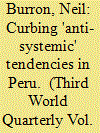

|
|
|
|
|
| Publication |
2011.
|
| Summary/Abstract |
Critical scholars and investigative journalists have developed a significant body of evidence demonstrating how US democracy assistance programmes undermine left and centre-left governments in Latin America. This article draws upon original research to examine how democracy promotion has sought to stabilise neoliberal polyarchy in Peru, a longtime regional ally of the US. It contributes to a neo-Gramsican theorisation of democracy programmes by examining how 'soft' tactics have contributed to the state's efforts at creating an inclusive neoliberal social order, a project which has ultimately failed. Particular attention is paid to the way in which US programmes were configured and carried out to respond to the rise of the 'anti-systemic' Peruvian nationalist party of Ollanta Humala, who won the recent presidential elections in June 2011.
|
|
|
|
|
|
|
|
|
|
|
|
|
|
|
|
| 11 |
ID:
086650
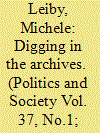

|
|
|
|
|
| Publication |
2009.
|
| Summary/Abstract |
This article explores the methodological obstacles to research on wartime sexual violence and the extent to which they can be overcome with archival research. It discusses issues of concept formation, counting victims of human rights abuse, and coding violations. It compares figures from the Peruvian Truth and Reconciliation Commission's final report, an analysis of the Commission's published materials, and an analysis of the primary documents and finds that (1) the number of reported cases of sexual violence is significantly higher than the 538 cited by the Commission, (2) men were more often the targets of sexual violence than previously thought, and (3) sexual humiliation and sexual torture were common practices during the war
|
|
|
|
|
|
|
|
|
|
|
|
|
|
|
|
| 12 |
ID:
117634
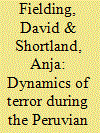

|
|
|
|
|
| Publication |
2012.
|
| Summary/Abstract |
The international community has a declared intention to protect civilians from deliberate violence in civil conflicts. The optimal type of foreign intervention and its optimal timing are likely to depend on the combat strategies of the belligerents. Weak belligerents unable to provide economic incentives and security guarantees to civilians often follow a strategy of intimidation and terror. In this case, foreign financial support for one side could affect the strategies of both sides in several different ways, and the interaction between the two sides' strategies could magnify the resulting impact on civilian casualties. Using a new monthly time-series dataset, we explore the factors associated with variations in the intensity of civilian abuse by participants in the guerrilla war in Peru during the 1980s and 1990s. We show that an increase in civilian abuse by one side was strongly associated with subsequent increases in abuse by the other. In this type of war, foreign intervention could substantially reduce the impact on civilians of a sudden rise in conflict intensity, by moderating the resulting 'cycle of violence'. In practice, foreign interventions had a mixed record in Peru: financial support for the Peruvian military raised the level of violence against civilians, but counter-narcotics aid and development aid reduced it. These effects are consistent with a model in which different types of intervention have different effects on belligerents' resource capacity and on the opportunity cost of fighting.
|
|
|
|
|
|
|
|
|
|
|
|
|
|
|
|
| 13 |
ID:
148223
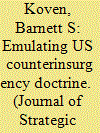

|
|
|
|
|
| Summary/Abstract |
Recent US advances in counterinsurgency doctrine have been adopted by developing country armed forces. Nevertheless, no systematic study has examined the barriers they face to implementing highly involved counterinsurgency strategy. Tracing the evolution of Peruvian doctrine demonstrates that Peru was able to quickly improve the unity of effort, intelligence capacity, and military basing to meet the demands of a population-centric hearts-and-minds approach to counterinsurgency. Nevertheless, the limited tactical initiative and flexibility of Peruvian forces remains a challenge. The Peruvian experience is instructive for other militaries undergoing similar transitions. However, given the diversity of insurgent conflicts, this doctrine is not universally appropriate.
|
|
|
|
|
|
|
|
|
|
|
|
|
|
|
|
| 14 |
ID:
187604
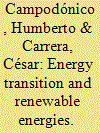

|
|
|
|
|
| Summary/Abstract |
Peru currently presents serious challenges in the promotion and production of renewable energies, making it difficult to fulfill its commitments to reduce greenhouse gas emissions within the framework of the United Nations Climate Change initiatives. Peru has a high renewable energy potential with various sources: solar, wind, geothermal, biomass and hydroelectric. However, after twelve years of having promulgated a law to promote the development of power plants that use renewable energy resources through auctions, only about 5% of current electricity generation comes from renewable sources and the auctions are suspended.
|
|
|
|
|
|
|
|
|
|
|
|
|
|
|
|
| 15 |
ID:
185743


|
|
|
|
|
| Summary/Abstract |
Pedro Castillo’s election as president of Peru in 2021 unleashed an unexpected series of historical debates in the bicentenary year of Peru’s independence. A left-wing union leader and rural teacher, Castillo was confronted by a stubborn conservative opposition that denounced his alleged communism, in a renewal of ideological confrontation that raised more questions about Peru’s nation-building process. This article argues that, paradoxically, the country’s present political precariousness created the conditions for the reemergence of these historical debates—and, because of that same reason, they might prove to be just another ephemeral process in a volatile country still coming to terms with its recent internal conflict.
|
|
|
|
|
|
|
|
|
|
|
|
|
|
|
|
| 16 |
ID:
076665
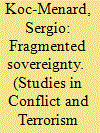

|
|
|
| 17 |
ID:
112505


|
|
|
|
|
| Publication |
2012.
|
| Summary/Abstract |
China's increasing, and increasingly visible, engagement in Latin America has led to a variety of analyses, many based on either international relations notions of realism or international political economy precepts of trade. Rather than seeing China's rhetoric on its relations with Latin America as fluff that conceals a harder reality, this article takes rhetoric seriously as a device of "framing and claiming": a way in which political elites in China interpret the fast-changing developing world and China's place in it. The article explores how political elites have understood the sources of China's own domestic development and then projected those notions on to other parts of the developing world, through earlier "fractal" logics of development whereby each state repeats one model of development in its own way and a currently dominant "division of labour" logic that posits one integrated model of development whereby complementarity and comparative advantage hold sway. The article concludes with a comparison of China's relations with Peru and Brazil, suggesting that China's bilateral relations with Brazil indicate a newer, emerging rhetoric of global partnership based on equality.
|
|
|
|
|
|
|
|
|
|
|
|
|
|
|
|
| 18 |
ID:
108610
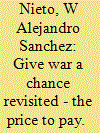

|
|
|
| 19 |
ID:
102579


|
|
|
|
|
| Publication |
2011.
|
| Summary/Abstract |
In stark contrast to the explosive growth of Chinese bilateral investment treaties (BITs), the utility of these BITs has been very limited, which is, as argued, attributable to the restrictive investor-State arbitration clauses in these BITs. Against this background, the jurisdictional award of the recent International Centre for Settlement of Investment Disputes case, Tza Yap Shum v. The Republic of Peru, therefore, is of particular significance as the governing treaty, the Agreement Between the Government of the People's Republic of China and the Government of Peru Concerning the Encouragement and Reciprocal Protection of Investments of 1994, embodied a narrow dispute settlement clause. This article attempts, in the context of established international investment case law, to scrutinize several key aspects of the investor-State arbitration clause that were heavily debated and arbitrated in the case of Tza Yap Shum as well as the treaty interpretation methodologies employed by the tribunal.
|
|
|
|
|
|
|
|
|
|
|
|
|
|
|
|
| 20 |
ID:
166143
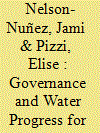

|
|
|
|
|
| Summary/Abstract |
While the world succeeded in meeting the Millennium Development Goal of halving the number of people without access to improved water sources, many were left behind. As the new Sustainable Development Goals aim to reach universal access by 2030, this article assesses the shortcomings of the MDGs and identifies factors that explain progress for the hardest to reach: the rural poor. The article draws on newly available data on water access by wealth quintiles and finds that rural governance quality is more important for extending water access to the rural poor than to the rich. Government capacity to design and implement policy is particularly important. This article extends the research on inequities in global development progress and the distributive effects of governance quality in development outcomes.
|
|
|
|
|
|
|
|
|
|
|
|
|
|
|
|
|
|
|
|
|